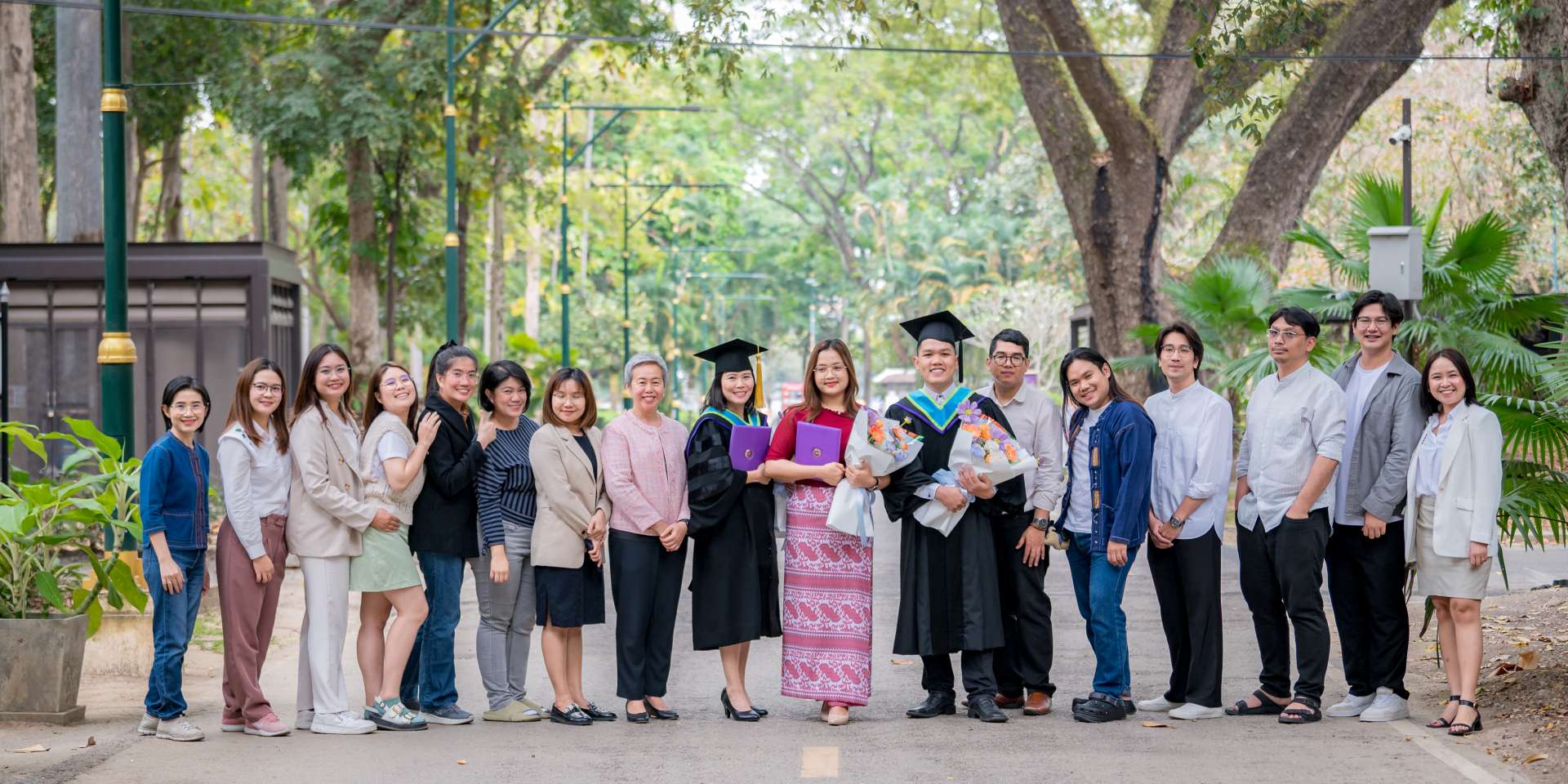The Chiang Mai University School of Public Policy (SPP) is the first public policy school established in Thailand. Aside from conducting high-quality research and providing consultations to governments, the school also offers graduate programs in public policy for academically ambitious students from within the region and beyond.

Who We Are
The first public policy school established in Thailand

We conduct research on public policy issues critical to sustainability
Our approach is multi-scale, pluralistic and inter-disciplinary. Ultimately, our interest is in influencing practices and outcomes, and so we are also interested in research that engages directly with affected stakeholders and responsible decision-makers, goals that require attention to deliberative processes and collaboration.
SPP Introduction
The School of Public Policy, Chiang Mai University (SPP, CMU) is a public policy school, concurrently operating as a cutting-edge research and consulting organization, committed to solving complex and wicked public problems with inclusive, innovative, transformative, and sustainable policy solutions.
SPP, offering academic degree programs at the Master and PhD levels, is propelled by the notion that civic and civil challenges must be confronted by not solely relying on fixed disciplines; rather, multiple branches of knowledge should be employed for decoding the roots of problems and cultivating effective solutions.
The foundational essence supporting this topical issues based platform is that our research work is not merely about crafting concepts and theories. Our products concentrate on tangibly influencing public policies in ways that generate practical implications for changing the laws, issuing new regulatory systems, and crafting incentives that encourage behaviors which holistically serve the public good.
SPP is one of few public policy schools explicitly operating within the framework of the 2030 United Nations Agenda for Sustainable Development. This Agenda includes seventeen sustainable development goals (SDGs), addressing everything from poverty to climate action. While all policy schools selectively focus on SDGs, SPP’s research work and training emphasizes peace and justice that is backed by strong and non-discriminatory institutions.
We are producing and promoting policy initiatives that build effective and accountable organizations supporting of cities and communities that are inclusive, safe, resilient, and sustainable. SPP is particularly mindful of policies coherence, how one strategy impacts aspects of others. We therefore take a multi-sector-collaborative approach to formulating sound, contextually specific, policies that acknowledge how public problems are ever-changing; therefore, it is imperative that up-to-date policy solutions involving the government, the market, and civil society are implemented.
SPP is not training public officials per se. We are developing the minds and skills of those who are aspiring to improve our human condition by shifting and shaking any and all sectors. Our vision and mission is to encourage responsible leadership. We are therefore supporting well-informed public policies crafted from deliberative forum-platforms that include citizens in the decision-making process and leave nobody behind.
SPP’s unique approach to public problems & policy generation
SPP is steering away from “we are producing the next generation of leaders” rhetoric and rather focusing on leadership development at all levels. We are pushing for data-driven and evidence based policy-making derived from deep understanding of the social contexts, and the narratives, encompassing public problems.
A typical public policy school program teaches fundamentals of politics, public administration, economics, and social science based theories. The academic programs that SPP offers also impart this knowledge. However, we uniquely blend society-based qualitative and science-supported quantitative methodology.
We are additionally focusing on the development and application of interdisciplinary, multi-level governance based, public policy action platforms. SPP’s students therefore interface with the realities of people’s history, communities’ socio-political structures, and belief systems. They become trained to see public problems systematically and analyze the root structures in-place that create real-world societal scenarios. They gain holistic understanding of how our human world works.
What students are we welcoming? What can be expected?
Chiang Mai University School of Public Policy (CMU-SPP) is grounded in philosophy that everyone can be policy-designers and impact public policies.
We are welcoming action-oriented and self-motivated people who see themselves as different from the mainstream; this is while identifying with being part of a global citizenry. Those with extraordinary life experiences, such as from societally marginalized circumstances and therefore harness particular perspectives on development phenomena, are highly encouraged to enquire about our program.
Regardless of background, SPP is collaborating with prudent risk-taking and courageous folks disheartened with deep-rooted societal hierarchies, incessant corruption, and ineffective public policies that are wasting everyone’s money and time. We are training people who are feeling deeply called to alleviate these public problems, who believe that our world should and can be organized differently, who are problem solvers and paradigms of thought shifters, and who are feeling tasked with encouraging other people to identify with a sense of global emergence.
SPP’s students — applying a “so what?” philosophy, which is about being action-oriented, practical, and sound policy-oriented — are rigorously mentored on how to think critically, while actually producing policy recommendations. This is while action-based learning alongside our interdisciplinary team of practitioners and academics working on public policy projects for government and non-government organizations in-need of immediate answers to contemporary issues.
Our school of thought is that scholars, throughout their tenure here of gaining real-life experience, tangible skills, and a life-supporting network from delving into this place and being part of its evolution, develop a particular character. SPP’s students grow toward an acquired capacity for seeing critically beyond known facts, which are merely supporting status quo worldviews and socio-political systems. They acquire comprehension about the inter-linkages of deep-rooted public problems and how we are all part of this global dynamic.
Infused also with empathetic deliberation skills necessary for discussing complex public issues, students become future-oriented and design thinking professional pracademics. Graduates move forward in life equipped with insight into and mastery about how sound public policies can be utilized for inclusive, innovative, progressive, and sustainable solutions to the most prominent public problems.
Is Chiang Mai University School of Public Policy appealing to you? Please contact us.

Chiang Mai University (CMU)
CMU School of Public Policy was established as an internal academic institute of Chiang Mai University
CMU is the first provincial university in Thailand, based on the government’s policy and the objectives of the northern people, as a center for academic and occupational knowledge in order to benefit the region and the country as a whole.
4
reasons
Why public policy is more important than ever before
The world is faced with ‘wicked’ problems
Firstly, the world is faced with many ‘wicked’ problems ranging from pandemics climate change, corruption, haze, terrorism, refugees, to urbanization issues. We are living in a VUCA world condition – Volatility, Uncertainty, Complexity, and Ambiguity. All of these complex problems hinder our global progress to achieve the 17 Sustainable Development Goals (SDG) of the UN. These pressing public problems, coupled with the rapid sociological, political, economic and technological changes today require public policy analysts to see problems and solutions as multifaceted. This includes the skill sets to analyze issues utilizing political, economic, managerial perspectives, and the ability to decipher quantitative and qualitative data sets, in addition to effectively communicate policy messages.
The processes of policymaking are a black box of complex sets
Secondly, in many parts of the world the processes of policymaking are a black box of complex sets of committees, consultants, bureaus, and other powerful actors. Often the process ignores the need to find evidence or sound data sets for policy decisions, which frequently leads to fail policies. Thus there is great need to foster ‘evidence-based policy-making’, which is essential for effective governance in all countries regardless of Social-economic levels.
Rapid growing trend of big data analytics and decision-making
In addition, there is rapid growing trend of big data analytics and decision-making, however the public sector is not capitalizing on this trend fast enough. Partly this is due to the lack of capacity to utilize the mass information obtained. There is great room to enhance policy ideas via crowdsourcing techniques and other online mechanisms.
Not enough real policy analysts in the world
Lastly, amidst all these needs, there are not enough real policy analysts in the world. Thus there is an urgent need to build a new generation of public policy scholars who have holistic views of public policy and governance in Asia.

Why study in Chiang Mai?
Chiang Mai University School of Public Policy (CMU-SPP) is situated 700 km. (435 miles) north of Bangkok, at Thailand’s second capital city of Chiang Mai. SPP considers this locale, dynamically comprised of ancient and modern paradigms, an ‘urban lab’ for comprehending the melting pot of worldwide urbanization phenomena that are also ensuing throughout Asia’s secondary (non-mega) cities.
SPP is offering this urban learning classroom to its students.
We are not pitching SPP by saying it is located in “the developing world” and therefore is a place for learning specifically about this. SPP is not promoting a Thailand perspective, or even the Se-Asia standpoint. An urban problem is an urban problem. An education problem is an education problem. Inequality is inequality, regardless of country or nationality. We are advocating for the emergence of a global perspective.
Chiang Mai, and therefore SPP, is a place for debating all perspectives. We are hence integrating into our team those who are open-minded enough to transform their mindsets and worldviews, in ways that can also be extrapolated and applied elsewhere.









